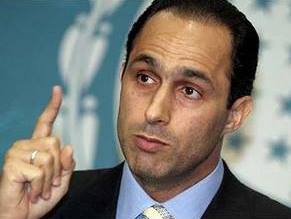|
World Jewish News

Gamal Mubarak (photo by ikhwanweb.com)
|
Mubarak signals Egypt succession by taking son to Washington
31.08.2010, Israel and the World Gamal Mubarak, son of Egyptian President Hosni Mubarak, will accompany his father to this week's Washington peace summit in what may be the clearest sign yet that he is being groomed for the succession.
Gamal has long been the center of speculation that he will replace his ageing father - but until now the 82-year-old president has kept his presumed heir at arm's length during high-profile international engagements.
This time, the younger of the president's two sons is expected to meet with Israeli delegates to U.S.-sponsored peace talks with the Palestinians, and perhaps even with Israeli Prime Minister Benjamin Netanyahu himself.
Two months ago Haaretz revealed that President Mubarak, who has ruled Egypt almost unopposed since 1982, is ill with cancer, prompting vehement denials from Cairo.
Over the past year, he has undergone treatment in Germany – ostensibly for back trouble – and France. This week he to return to Paris en route to the United States for talks with French President Nicholas Sarkozy. It is not known if there are also medical grounds for the stopover.
News of Mubarak's ailing health has lent increased urgency to speculation over his successor. The president has not said if he will run for a sixth term in presidential elections scheduled for next year, though he has vowed to stay in office until his last breath.
Mubarak has never appointed a vice president, and there is no political figure of comparable stature to stand out as an election possibility – although Mohammed El Baradei, a former chief of the International Atomic Energy Agency, has emerged as a possible opposition candidate.
Most observers still see Gamal as the frontrunner for the leadership, however, and a recent poster campaign calling for his candidacy has been interpreted as a push by his allies within the governing National Democratic Party to convince doubters of his ability to lead.
By Avi Issacharoff
Haaretz.com
|
|
